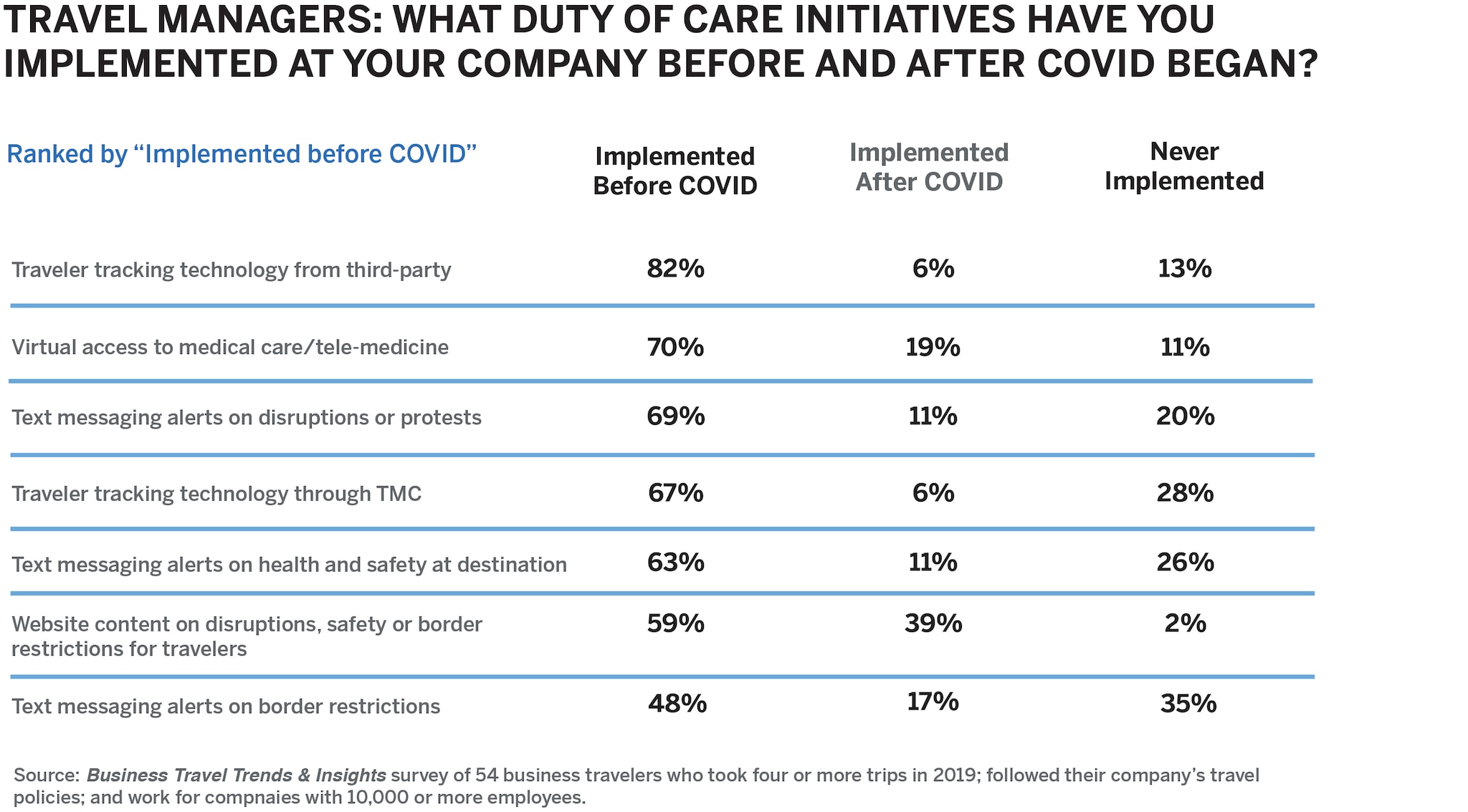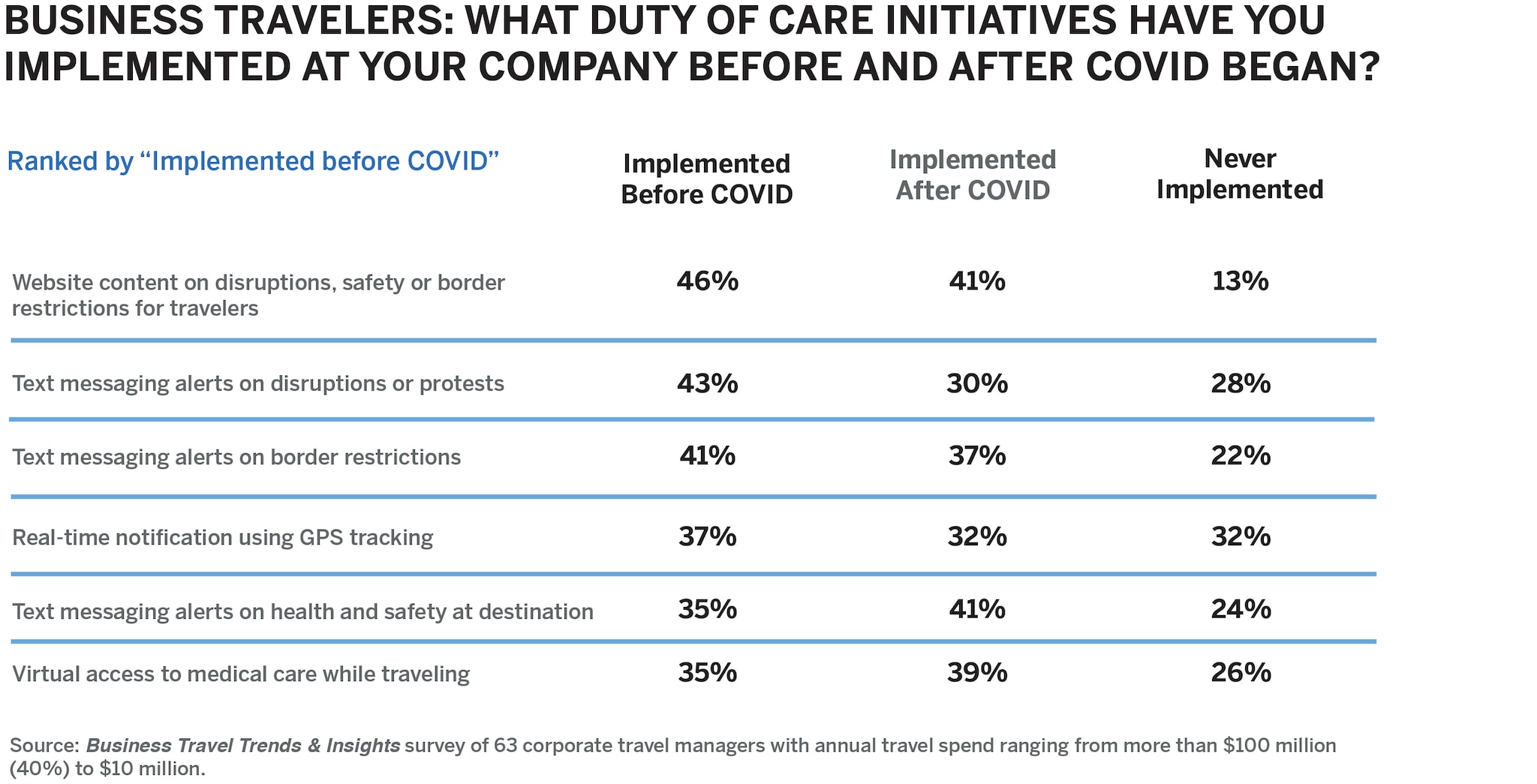“Look for more investment in traveler tracking, location-based services, and real-time alerts over the next year”
Anything can happen when we’re on the road. There could be social or political unrest at our destination, causing gridlock at best and threatening our security at worst. Maybe there’s a weather event that grounds planes and strand travelers. Or a disruption on a flight that causes re-routing. There’s a long list of possible hazards that can derail a trip but perhaps none as far-reaching as COVID. The pandemic has influenced every stage of the travel journey – from planning (will borders open in time? Is it safe to travel?), to booking (can I cancel if I must?), to maneuvering safely and freely at the destination (what to do if I get sick? Or stuck?). That’s where duty of care comes into play for some, but not all, business travelers.
Most travel programs have duty of care programs to notify and track travelers, but not every travel program is the same. For example, some offer real-time SMS alerts and warnings, while others might just have a website for reference. Some might provide access to doctor visits while others offer virtual medical care. Overall, the verdict on duty of care is in – and it’s looking pretty good. According to the Business Travel Trends & Insights survey conducted by BTN Group Content Solutions in August, nearly eight in 10 travel managers and business travelers find duty of care programs effective – and more than one third find them “very” effective. But some aspects are still missing that could provide even more protection for employees.
About four out of 10 travel managers have implemented new duty of care services since March 2020, with the greatest percentage developing those services in house. Many were caught blind-sided by the pandemic: nearly four in 10 added website content related to disruptions, health & safety, and border restrictions after COVID made it imperative to do so. And one fifth quickly added virtual access to medical care in case of an emergency.

Most companies, however, have been investing in duty of care for so long that they were mostly prepared when the pandemic hit. A little more than half said they didn’t implement any changes because they always had a rigorous duty of care program (only 6% don’t have a duty of care program at all). Seven in 10 said they already offered virtual access to medical care/tele-medicine and text messaging alerts related to disruptions and political volatility. Six in 10 provided alerts related to health & safety at the destination as well as website content related to disruptions, health & safety, and border restrictions that the traveler can access.
Tracking and Alerting Travelers When They Need it Most
Among all services, traveler tracking was the most popular to have implemented even prior to COVID. Using mobile location-based technology, companies can locate travelers and text message warnings of impending disruptions. More than two thirds of respondents offer this feature through their TMC and eight in 10 use another supplier (there is overlap among the two). There is still a long way to go with this safety initiative, however, as three in 10 companies have never instituted any type of traveler tracking at all.
Tracking travelers is one thing – actively communicating the everchanging maze of border openings/closings is quite another. Less than half of respondents offered text messaging alerts on border restrictions before COVID, and only 17% have implemented that since then. This means more than one third (35%) of companies do not push out border rules to travelers in real-time, on the fly and when most needed, although most do provide access to website content of the same vein that employees can access.
More than one-fifth of business travelers surveyed said their company has never implemented text messaging alerts of any kind, and three in 10 do not get real time notifications via GPS tracking. But they’re in the minority. COVID has opened a whole new array of services to business travelers. Four in 10 said their company implemented website content related to safe travel, text messaging alerts related to health & safety as well as virtual access to medical care while traveling. And nearly eight in 10 now have access to text messaging alerts related to border restrictions.

Conclusion
Corporations know they have an ethical obligation to keep their employees safe and healthy while traveling and they’ve been mostly prepared for something as widespread as the pandemic. But the unpredictable nature of border restrictions and protocols is hard for even the most advanced duty of care program to follow. Look for more investment in traveler tracking, location-based services, and real-time alerts over the next year so that companies can be more proactive in warning travelers of new rules and disruptions. Unfortunately, the need won’t go away any time soon, and being prepared is the best prevention for future surprises.



